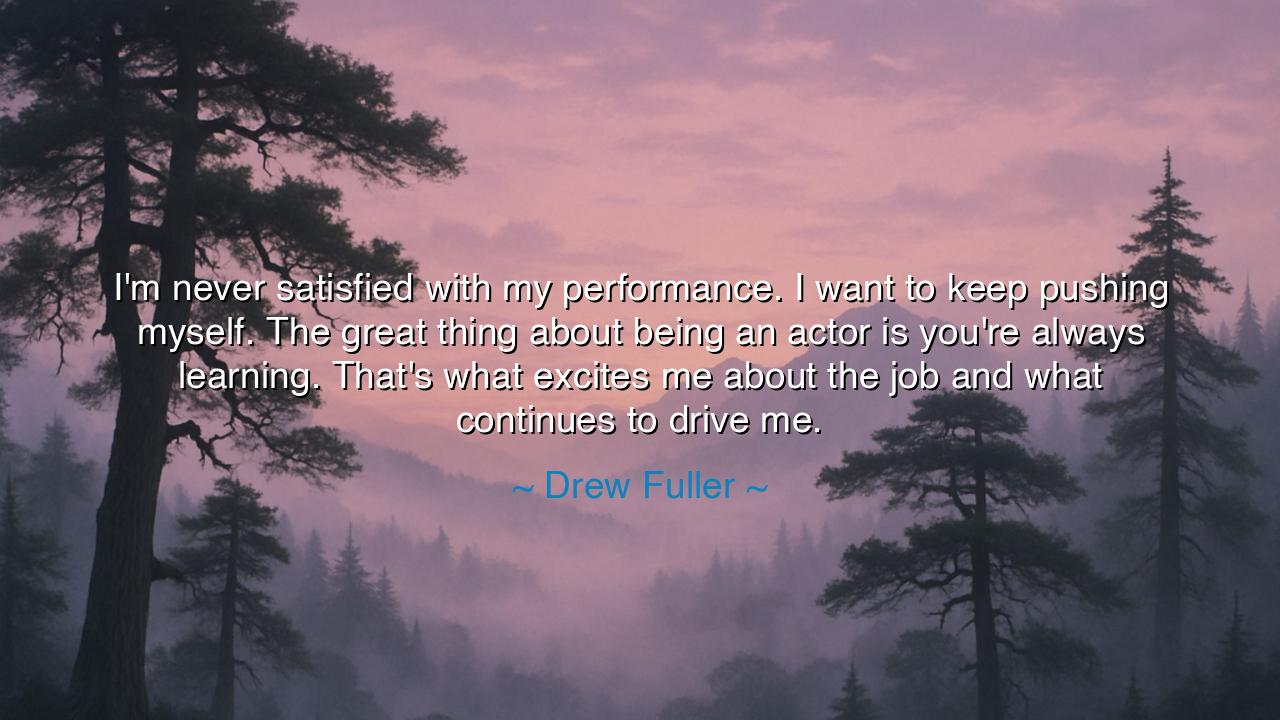
I'm never satisfied with my performance. I want to keep pushing
I'm never satisfied with my performance. I want to keep pushing myself. The great thing about being an actor is you're always learning. That's what excites me about the job and what continues to drive me.






When Drew Fuller said, “I'm never satisfied with my performance. I want to keep pushing myself. The great thing about being an actor is you're always learning. That's what excites me about the job and what continues to drive me,” he was not merely speaking as an artist of the stage, but as a philosopher of the soul. His words reveal a timeless principle—the sacred fire of restless growth, the refusal to grow complacent, and the eternal hunger to learn. In this confession lies a truth older than empires: that mastery is not a destination, but a pilgrimage, and that the moment one believes they have arrived, their journey of greatness begins to fade.
In the tone of the ancients, Fuller’s statement is the echo of a warrior’s vow—to forever strive, never to rest upon laurels, and to treat each victory not as an ending but as a new beginning. “I’m never satisfied,” he declares, and in those words lives the same spirit that moved Alexander the Great, who wept when there were no more worlds to conquer—not for greed, but for the ache of purpose unfulfilled. Satisfaction, to the creative soul, can be a kind of death. For it is in dissatisfaction, in the yearning for betterment, that one finds the pulse of life itself. Fuller’s wisdom is a reminder that contentment without aspiration is stagnation, and that the true artist—be he sculptor, scholar, or actor—must forever dwell in the beautiful tension between pride in achievement and hunger for more.
The heart of his message, however, is not pride, but humility. “You’re always learning,” he says—an admission that no one, however skilled, stands above the lessons of the craft. In this humility lies the secret of greatness. The ancients called it arete, the pursuit of excellence through continual refinement. Even the masters, they taught, must remain apprentices of their own calling. The swordsmith, though old and weary, still tests his blade against the whetstone; the philosopher, though praised for wisdom, still questions the nature of truth. So it is with the artist, whose work is never finished, because perfection is infinite, and infinity can only be approached, never possessed.
There is a story told of Leonardo da Vinci, who, though celebrated across Europe, would return to his paintings again and again, adjusting the smallest details. When asked why, he replied, “Art is never finished, only abandoned.” His restlessness was not failure—it was devotion. Like Fuller, Leonardo understood that to cease striving is to betray the gift of talent itself. The true creator is driven not by applause, but by the pursuit of deeper understanding, by the thrill of what remains just beyond reach. That is why Fuller’s words ring with the tone of the eternal: he speaks for all who burn with the desire to grow beyond their present form.
And yet, beneath this striving lies joy, not torment. “That’s what excites me about the job,” Fuller says. In those words is the revelation that growth, though demanding, is also exhilarating. To wake each day with something new to learn, to fail and rise again stronger, to discover corners of one’s own potential previously unseen—this is the life of those who live fully. The ancients likened such a spirit to the flame of the hearth—ever consuming, yet ever giving warmth. The actor who learns a new gesture, the craftsman who perfects his design, the thinker who uncovers a deeper question—all are kindled by this same sacred fire of becoming.
Fuller’s reflection also teaches that discipline is love in action. To push oneself, as he says, is not self-punishment—it is reverence for one’s gift. The actor who rehearses long after the others have gone home, the writer who reworks a single sentence through sleepless nights, the athlete who trains in solitude—all are bound by this devotion. They know that excellence is not granted but earned, through countless small sacrifices that the world may never see. To “push oneself,” then, is to honor the divine spark within, the whisper of potential that demands to be awakened.
Let this teaching, then, be carried forward: never let satisfaction dull the edge of your ambition. Whether your art is in words, in labor, in compassion, or in creation, keep pushing the boundary of what you know. Rejoice in imperfection, for it means you are still learning, still growing, still alive. When fatigue whispers that you have done enough, remember Drew Fuller’s wisdom—that the journey itself is the source of joy, that mastery is not a crown but a compass. To live in this way is to walk the eternal path of the seeker, and to know that each day spent learning, striving, and growing is a victory greater than applause. For the one who is never satisfied is the one who will forever ascend.






AAdministratorAdministrator
Welcome, honored guests. Please leave a comment, we will respond soon